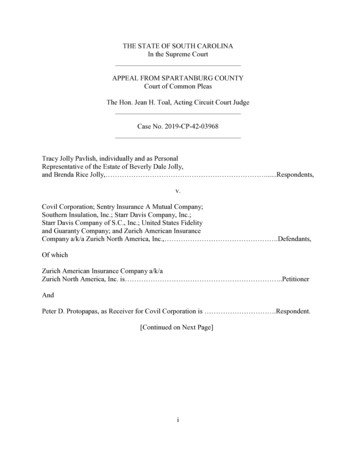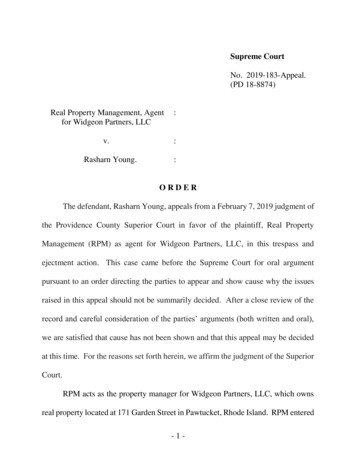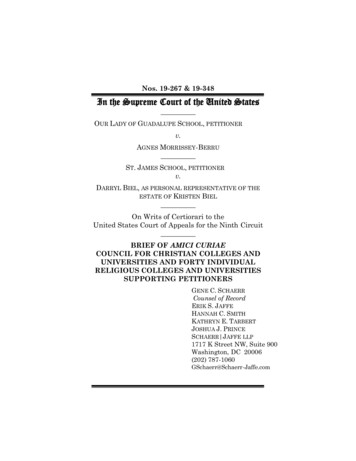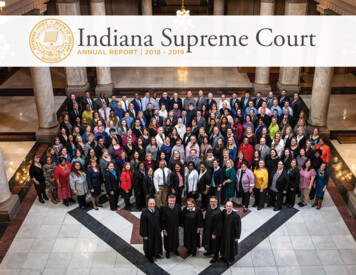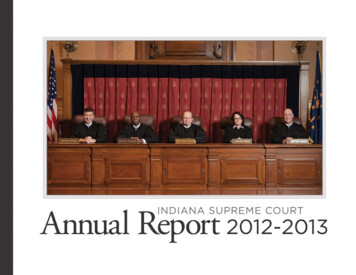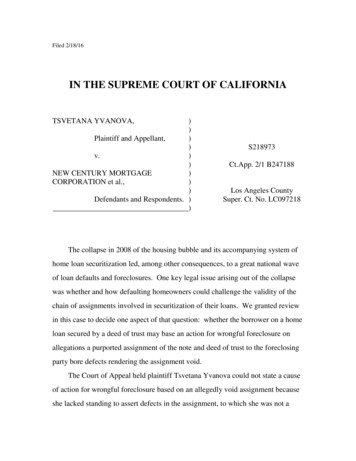
Transcription
Filed 2/18/16IN THE SUPREME COURT OF CALIFORNIATSVETANA YVANOVA,))Plaintiff and Appellant,))v.))NEW CENTURY MORTGAGE)CORPORATION et al.,))Defendants and Respondents. ))S218973Ct.App. 2/1 B247188Los Angeles CountySuper. Ct. No. LC097218The collapse in 2008 of the housing bubble and its accompanying system ofhome loan securitization led, among other consequences, to a great national waveof loan defaults and foreclosures. One key legal issue arising out of the collapsewas whether and how defaulting homeowners could challenge the validity of thechain of assignments involved in securitization of their loans. We granted reviewin this case to decide one aspect of that question: whether the borrower on a homeloan secured by a deed of trust may base an action for wrongful foreclosure onallegations a purported assignment of the note and deed of trust to the foreclosingparty bore defects rendering the assignment void.The Court of Appeal held plaintiff Tsvetana Yvanova could not state a causeof action for wrongful foreclosure based on an allegedly void assignment becauseshe lacked standing to assert defects in the assignment, to which she was not a
party. We conclude, to the contrary, that because in a nonjudicial foreclosure onlythe original beneficiary of a deed of trust or its assignee or agent may direct thetrustee to sell the property, an allegation that the assignment was void, and notmerely voidable at the behest of the parties to the assignment, will support anaction for wrongful foreclosure.Our ruling in this case is a narrow one. We hold only that a borrower whohas suffered a nonjudicial foreclosure does not lack standing to sue for wrongfulforeclosure based on an allegedly void assignment merely because he or she wasin default on the loan and was not a party to the challenged assignment. We do nothold or suggest that a borrower may attempt to preempt a threatened nonjudicialforeclosure by a suit questioning the foreclosing party‘s right to proceed. Nor dowe hold or suggest that plaintiff in this case has alleged facts showing theassignment is void or that, to the extent she has, she will be able to prove thosefacts. Nor, finally, in rejecting defendants‘ arguments on standing do we addressany of the substantive elements of the wrongful foreclosure tort or the factualshowing necessary to meet those elements.FACTUAL AND PROCEDURAL BACKGROUNDThis case comes to us on appeal from the trial court‘s sustaining of ademurrer. For purposes of reviewing a demurrer, we accept the truth of materialfacts properly pleaded in the operative complaint, but not contentions, deductions,or conclusions of fact or law. We may also consider matters subject to judicialnotice. (Evans v. City of Berkeley (2006) 38 Cal.4th 1, 6.)1 To determine whetherThe superior court granted defendants‘ request for judicial notice of therecorded deed of trust, assignment of the deed of trust, substitution of trustee,notices of default and of trustee‘s sale, and trustee‘s deed upon sale. The existenceand facial contents of these recorded documents were properly noticed in the trialcourt under Evidence Code sections 452, subdivisions (c) and (h), and 453. (See1(footnote continued on next page)2
the trial court should, in sustaining the demurrer, have granted the plaintiff leaveto amend, we consider whether on the pleaded and noticeable facts there is areasonable possibility of an amendment that would cure the complaint‘s legaldefect or defects. (Schifando v. City of Los Angeles (2003) 31 Cal.4th 1074,1081.)In 2006, plaintiff executed a deed of trust securing a note for 483,000 on aresidential property in Woodland Hills, Los Angeles County. The lender, andbeneficiary of the trust deed, was defendant New Century Mortgage Corporation(New Century). New Century filed for bankruptcy on April 2, 2007, and onAugust 1, 2008, it was liquidated and its assets were transferred to a liquidationtrust.On December 19, 2011, according to the operative complaint, New Century(despite its earlier dissolution) executed a purported assignment of the deed oftrust to Deutsche Bank National Trust, as trustee of an investment loan trust thecomplaint identifies as ―Msac-2007 Trust-He-1 Pass Thru Certificates.‖ We takenotice of the recorded assignment, which is in the appellate record. (See fn. 1,ante.) As assignor the recorded document lists New Century; as assignee it listsDeutsche Bank National Trust Company (Deutsche Bank) ―as trustee for theregistered holder of Morgan Stanley ABS Capital I Inc. Trust 2007-HE1 MortgagePass-Through Certificates, Series 2007-HE1‖ (the Morgan Stanley investment(footnote continued from previous page)Fontenot v. Wells Fargo Bank, N.A. (2011) 198 Cal.App.4th 256, 264–266.)Under Evidence Code section 459, subdivision (a), notice by this court is thereforemandatory. We therefore take notice of their existence and contents, though not ofdisputed or disputable facts stated therein. (See Glaski v. Bank of America (2013)218 Cal.App.4th 1079, 1102.)3
trust). The assignment states it was prepared by Ocwen Loan Servicing, LLC,which is also listed as the contact for both assignor and assignee and as theattorney in fact for New Century. The assignment is dated December 19, 2011,and bears a notation that it was recorded December 30, 2011.According to the complaint, the Morgan Stanley investment trust to whichthe deed of trust on plaintiff‘s property was purportedly assigned on December 19,2011, had a closing date (the date by which all loans and mortgages or trust deedsmust be transferred to the investment pool) of January 27, 2007.On August 20, 2012, according to the complaint, Western Progressive, LLC,recorded two documents: one substituting itself for Deutsche Bank as trustee, theother giving notice of a trustee‘s sale. We take notice of a substitution of trustee,dated February 28, 2012, and recorded August 20, 2012, replacing Deutsche Bankwith Western Progressive, LLC, as trustee on the deed of trust, and of a notice oftrustee‘s sale dated August 16, 2012, and recorded August 20, 2012.A recorded trustee‘s deed upon sale dated December 24, 2012, states thatplaintiff‘s Woodland Hills property was sold at public auction on September 14,2012. The deed conveys the property from Western Progressive, LLC, as trustee,to the purchaser at auction, THR California LLC, a Delaware limited liabilitycompany.Plaintiff‘s second amended complaint, to which defendants demurred,pleaded a single count for quiet title against numerous defendants including NewCentury, Ocwen Loan Servicing, LLC, Western Progressive, LLC, DeutscheBank, Morgan Stanley Mortgage Capital, Inc., and the Morgan Stanley investmenttrust. Plaintiff alleged the December 19, 2011, assignment of the deed of trustfrom New Century to the Morgan Stanley investment trust was void for tworeasons: New Century‘s assets had previously, in 2008, been transferred to abankruptcy trustee; and the Morgan Stanley investment trust had closed to new4
loans in 2007. (The demurrer, of course, does not admit the truth of this legalconclusion; we recite it here only to help explain how the substantive issues in thiscase were framed.) The superior court sustained defendants‘ demurrer withoutleave to amend, concluding on several grounds that plaintiff could not state acause of action for quiet title.The Court of Appeal affirmed the judgment for defendants on their demurrer.The pleaded cause of action for quiet title failed fatally, the court held, becauseplaintiff did not allege she had tendered payment of her debt. The court went onto discuss the question, on which it had sought and received briefing, of whetherplaintiff could, on the facts alleged, amend her complaint to plead a cause ofaction for wrongful foreclosure.On the wrongful foreclosure question, the Court of Appeal concluded leaveto amend was not warranted. Relying on Jenkins v. JPMorgan Chase Bank, N.A.(2013) 216 Cal.App.4th 497 (Jenkins), the court held plaintiff‘s allegations ofimproprieties in the assignment of her deed of trust to Deutsche Bank were of noavail because, as an unrelated third party to that assignment, she was unaffected bysuch deficiencies and had no standing to enforce the terms of the agreementsallegedly violated. The court acknowledged that plaintiff‘s authority, Glaski v.Bank of America, supra, 218 Cal.App.4th 1079 (Glaski), conflicted with Jenkinson the standing issue, but the court agreed with the reasoning of Jenkins anddeclined to follow Glaski.We granted plaintiff‘s petition for review, limiting the issue to be briefed andargued to the following: ―In an action for wrongful foreclosure on a deed of trustsecuring a home loan, does the borrower have standing to challenge an assignmentof the note and deed of trust on the basis of defects allegedly rendering theassignment void?‖5
DISCUSSIONI. Deeds of Trust and Nonjudicial ForeclosureA deed of trust to real property acting as security for a loan typically hasthree parties: the trustor (borrower), the beneficiary (lender), and the trustee.―The trustee holds a power of sale. If the debtor defaults on the loan, thebeneficiary may demand that the trustee conduct a nonjudicial foreclosure sale.‖(Biancalana v. T.D. Service Co. (2013) 56 Cal.4th 807, 813.) The nonjudicialforeclosure system is designed to provide the lender-beneficiary with aninexpensive and efficient remedy against a defaulting borrower, while protectingthe borrower from wrongful loss of the property and ensuring that a properlyconducted sale is final between the parties and conclusive as to a bona fidepurchaser. (Moeller v. Lien (1994) 25 Cal.App.4th 822, 830.)The trustee starts the nonjudicial foreclosure process by recording a notice ofdefault and election to sell. (Civ. Code, § 2924, subd. (a)(1).)2 After athree-month waiting period, and at least 20 days before the scheduled sale, thetrustee may publish, post, and record a notice of sale. (§§ 2924, subd. (a)(2),2924f, subd. (b).) If the sale is not postponed and the borrower does not exercisehis or her rights of reinstatement or redemption, the property is sold at auction tothe highest bidder. (§ 2924g, subd. (a); Jenkins, supra, 216 Cal.App.4th at p. 509;Moeller v. Lien, supra, 25 Cal.App.4th at pp. 830–831.) Generally speaking, theforeclosure sale extinguishes the borrower‘s debt; the lender may recover nodeficiency. (Code Civ. Proc., § 580d; Dreyfuss v. Union Bank of California(2000) 24 Cal.4th 400, 411.)2All further unspecified statutory references are to the Civil Code.6
The trustee of a deed of trust is not a true trustee with fiduciary obligations,but acts merely as an agent for the borrower-trustor and lender-beneficiary.(Biancalana v. T.D. Service Co., supra, 56 Cal.4th at p. 819; Vournas v. FidelityNat. Tit. Ins. Co. (1999) 73 Cal.App.4th 668, 677.) While it is the trustee whoformally initiates the nonjudicial foreclosure, by recording first a notice of defaultand then a notice of sale, the trustee may take these steps only at the direction ofthe person or entity that currently holds the note and the beneficial interest underthe deed of trust—the original beneficiary or its assignee—or that entity‘s agent.(§ 2924, subd. (a)(1) [notice of default may be filed for record only by ―[t]hetrustee, mortgagee, or beneficiary‖]; Kachlon v. Markowitz (2008) 168Cal.App.4th 316, 334 [when borrower defaults on the debt, ―the beneficiary maydeclare a default and make a demand on the trustee to commence foreclosure‖];Santens v. Los Angeles Finance Co. (1949) 91 Cal.App.2d 197, 202 [only a personentitled to enforce the note can foreclose on the deed of trust].)Defendants emphasize, correctly, that a borrower can generally raise noobjection to assignment of the note and deed of trust. A promissory note is anegotiable instrument the lender may sell without notice to the borrower.(Creative Ventures, LLC v. Jim Ward & Associates (2011) 195 Cal.App.4th 1430,1445–1446.) The deed of trust, moreover, is inseparable from the note it secures,and follows it even without a separate assignment. (§ 2936; Cockerell v. Title Ins.& Trust Co. (1954) 42 Cal.2d 284, 291; U.S. v. Thornburg (9th Cir. 1996) 82 F.3d886, 892.) In accordance with this general law, the note and deed of trust in thiscase provided for their possible assignment.A deed of trust may thus be assigned one or multiple times over the life ofthe loan it secures. But if the borrower defaults on the loan, only the currentbeneficiary may direct the trustee to undertake the nonjudicial foreclosure process.―[O]nly the ‗true owner‘ or ‗beneficial holder‘ of a Deed of Trust can bring to7
completion a nonjudicial foreclosure under California law.‖ (Barrionuevo v.Chase Bank, N.A. (N.D.Cal. 2012) 885 F.Supp.2d 964, 972; see Herrera v.Deutsche Bank National Trust Co. (2011) 196 Cal.App.4th 1366, 1378 [bank andreconveyance company failed to establish they were current beneficiary andtrustee, respectively, and therefore failed to show they ―had authority to conductthe foreclosure sale‖]; cf. U.S. Bank Nat. Assn. v. Ibanez (Mass. 2011) 941 N.E.2d40, 51 [under Mass. law, only the original mortgagee or its assignee may conductnonjudicial foreclosure sale].)In itself, the principle that only the entity currently entitled to enforce a debtmay foreclose on the mortgage or deed of trust securing that debt is not, or at leastshould not be, controversial. It is a ―straightforward application[] of wellestablished commercial and real-property law: a party cannot foreclose on amortgage unless it is the mortgagee (or its agent).‖ (Levitin, The Paper Chase:Securitization, Foreclosure, and the Uncertainty of Mortgage Title (2013) 63Duke L.J. 637, 640.) Describing the copious litigation arising out of the recentforeclosure crisis, a pair of commentators explained: ―While plenty of uncertaintyexisted, one concept clearly emerged from litigation during the 2008-2012 period:in order to foreclose a mortgage by judicial action, one had to have the right toenforc
with Western Progressive, LLC, as trustee on the deed of trust, and of a notice of trustee‘s sale dated August 16, 2012, and recorded August 20, 2012. A recorded trustee‘s deed upon sale dated December 24, 2012, states that plaintiff‘s Woodland Hills property was sold at public auction on September 14, 2012. The deed conveys the property from Western Progressive, LLC, as trustee, to the .
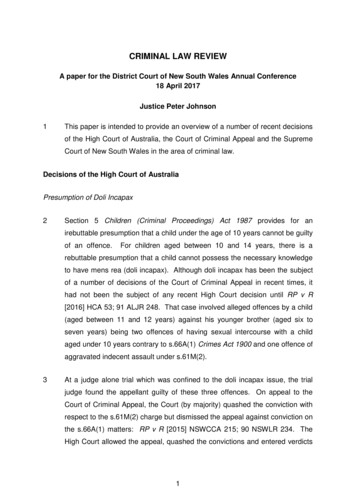
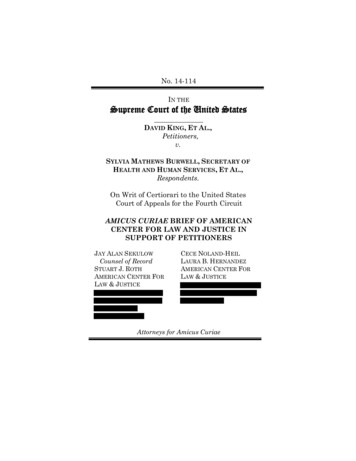
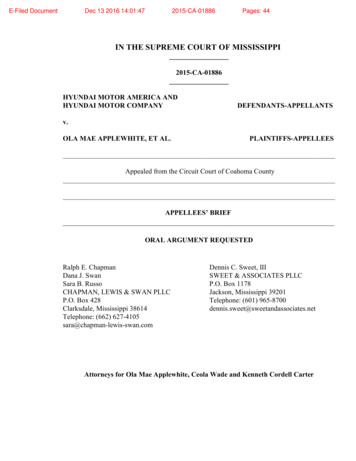
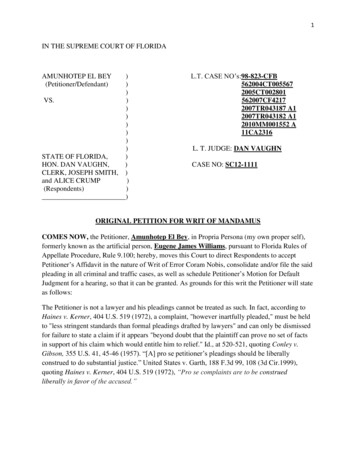
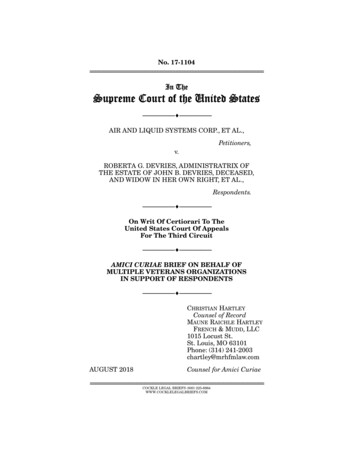
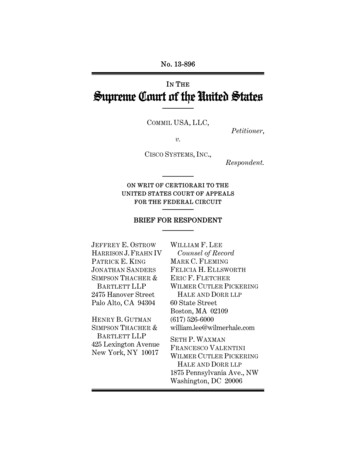
![IN THE SUPREME COURT OF T]-lE STATE OF MONTANA](/img/7/526b198c923f8.jpg)
